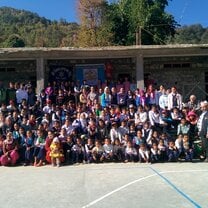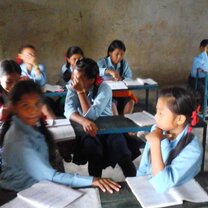Each day started early as my host family lived on a small farm consisting of a few cows (witnessed two calves being born while I was there in the spring) and terraced fields of various items like oranges, chilies, gladiolus and others that rotate with the seasons. Mrs Durga would make a hot spiced tea and serve a breakfast of rice and other mixtures with a hard boiled egg. Doesn't sound especially appetizing now that I write it, but I remember looking forward to it each morning.
After feeding the cows and some yard work, Mr Durga and Baba (his father) would take tea with me outside and greet neighbors passing along the many paths that connected the homes and small villages along the mountainside. Breakfast and visiting done, I would wash up in an attached toilet and outdoor sink (the shower was more of a bucket of cold water that you could make into a shower, but I found it easier to just wet myself, soap up, then douce myself with small bowls of water from the bucket - I did this in the afternoon when it was warm as there was no hot water).
A couple of the children who lived further up the "road" would come by and we we'd walk down a series of paths through backyards, waving to and greeting neighbors working in their yards, while additional school children joined us on our route to the school. By the time we reached the new road that was being built outside the school, there'd be ten of us with some of the children singing or telling stories. Once at the school, the children would line up according to grade and one of the teachers would give instruction for daily yoga routines, while another checked their school uniforms, shoes, fingernails and teeth for cleanliness (the school provided a number of these items to some students who could not afford them on their own).
The students would then filter into their partitioned rooms on long narrow benches and tables facing a chalkboard and we'd get started. I taught 4 classes of English a day which included 1st, 2nd, 3rd, and 4th grades (at the time there was only one 5th grader and no 6th as the school was only a few years old). I taught from books where the children told me they'd left off, and used some games and other activities to help them relax and enjoy the class. My goal was for them to understand why a sentence was constructed a certain way, or why a word may mean different things if used different ways, or how to use a dictionary or thesaurus.
This may sound obvious, but the local standard is learning by rote: repeating or copying sentences over and over again with little understanding of the meaning. Took me a while to figure out what each class and individual was capable of, and then even longer to figure out how to capture their attention and interest - really wish I'd had more time to keep going.
My day ended early around noon when the children took recess and lunch and I went back up the mountain to go home and have lunch. I'd visit with Mrs Durga for a little while - she'd teach me some Nepali words or recipes and I'd exchange with English. My afternoons were free and I spent them taking walks, reading and daydreaming.
It's been five years since my trip and I can still remember it all like it was yesterday. I think the thing I'll remember most and which I think of often is the kindness and compassion of my host family. They are such good people and do so much for so many. Their son Sorev shares their same gentleness and generosity (with as little as they have) as his parents and grandparents. He is very bright and I expect to hear great things of him in the future.










